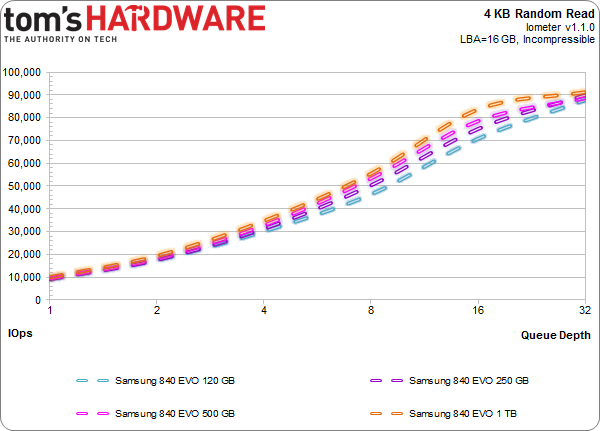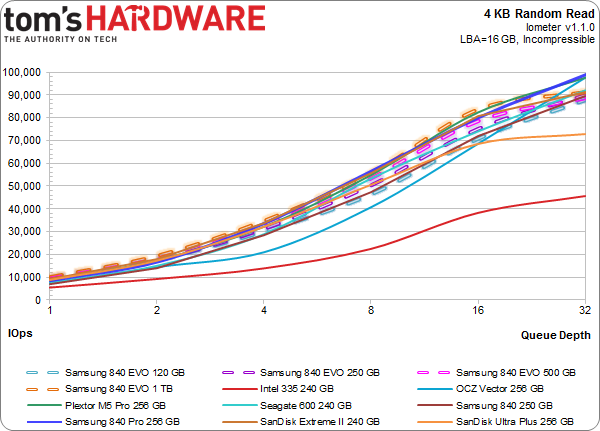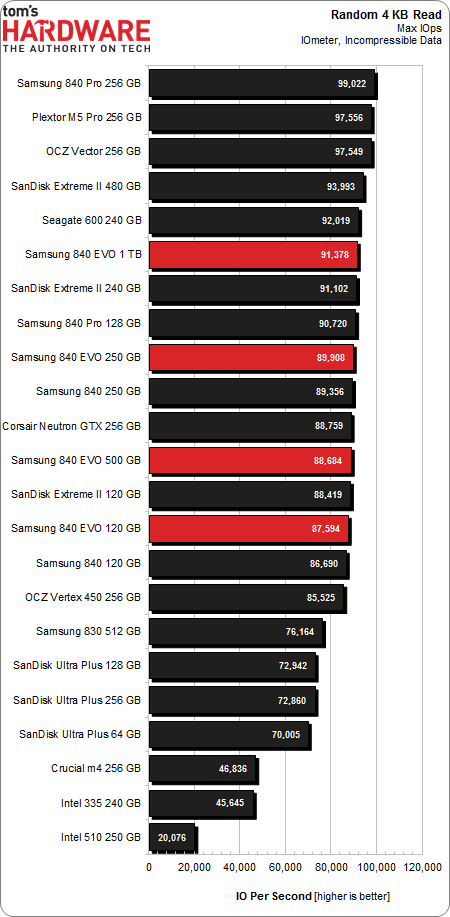Samsung 840 EVO SSD: Tested At 120, 250, 500, And 1000 GB
Last week, Samsung unveiled a successor to its wildly popular 840 at the company's Global SSD Summit in Seoul, South Korea. Stacked with a series of new features and 19 nm, three-bit-per-cell NAND, we benchmark four models and make a recommendation.
Results: 4 KB Random Reads
Technically, "random" translates to a consecutive access that occurs more than one sector away. On a mechanical hard disk, this can lead to significant latencies that hammer performance. Spinning media simply handles sequential accesses much better than random ones, since the heads don't have to be physically repositioned. With SSDs, the random/sequential access distinction is much less relevant. Data are put wherever the controller wants, so the idea that the operating system sees one piece of information next to another is mostly just an illusion.
4 KB Random Reads
Turbo Write obviously doesn't help with random reads, so the complicated situation from the previous page doesn't apply. Each drive lands where we'd expect. They all hit the 90,000 IOPS mark at a queue depth of 32 and achieve 10,000 IOPS at a queue depth of one.
Samsung specifically mentioned that it optimized performance for a single outstanding command, and those efforts show. The fact that Samsung is seeing these read speeds and using triple-level-cell NAND is going to make a few competitors green with envy.
Samsung's newest efforts are eclipsed by a small cadre of performance-oriented SSDs, but by slim and frankly inconsequential margins. The 840 EVOs are faster than the 512 GB 830 and both 840s.
We look to maximum 4 KB read speeds for additional perspective. Some separation does occur, but again it's not particularly significant. It doesn't take much flash to achieve spectacular read performance, so we'll need to move on to writes for a clearer picture of performance differentiation.
Get Tom's Hardware's best news and in-depth reviews, straight to your inbox.
Current page: Results: 4 KB Random Reads
Prev Page Results: 128 KB Sequential Writes Next Page Results: 4 KB Random Writes-
Someone Somewhere Surely it would make sense to compare it to the vanilla SSD840. Also, there's no 840 Pro in the power charts.Reply
While the 1TB drive coming down to ~65c/GB is nice, seeing the 120 GB drives get near there would be nice. Especially since this is meant to be the value king. -
drwho1 I have 2 840 pro 512 GB SSD's (1 on my notebook 1 on my PC)Reply
I got them on a sale on Newegg for around $500 for both of them. :)
A 1TB would be cool if I find it on sale....
or maybe I should try out writing a letter to someone fat in some weird red costume...
-
slomo4sho The performance gap between the 840 Evo and 840 Pro is discouraging for the lower capacity models. I understand that the Pro is the flagship product but I was expecting less of a gap in in the 120GB models since this is a newer generation product and the 840 Pro is still based on the 21nm MLC NAND. However, the 1TB model is is a great choice for mass SSD storage. Lets hope the prices drop below $0.50 per GB soon.Reply -
Someone Somewhere MLC is faster than TLC, and bigger node NAND is usually faster. Only reason to go smaller is price and power.Reply -
SteelCity1981 I wonder if samsung plans on releasing a pro evo series since the regular series evo is to replace the older non pro versions.Reply -
razor512 ripoff, high prices for triple level flash especially at 19mm, the lifespan will likely suck and their shortened warranty represents that.Reply -
master9716 Cost for performance = Very High . ofcourse its not going to perform like a Pro but for the cost im amazed its that much better than the Regular 840.Reply -
J_E_D_70 Glad this review also refutes the perception of low TLC write endurance in normal desktop workloads. Been using a 128GB 840 in a daily-use desktop for eight months now and the endurance counter hasn't decremented at all. I'll have replaced the entire rig long before it wears out.Reply -
JohnnyLucky Interesting review. I think the point to remember is that the 840 EVO is not a high end enthusiast ssd like the 840 Pro. Instead, consider the 840 EVO as a mainstream ssd suitable for most consumer and home office scenarios.Reply


